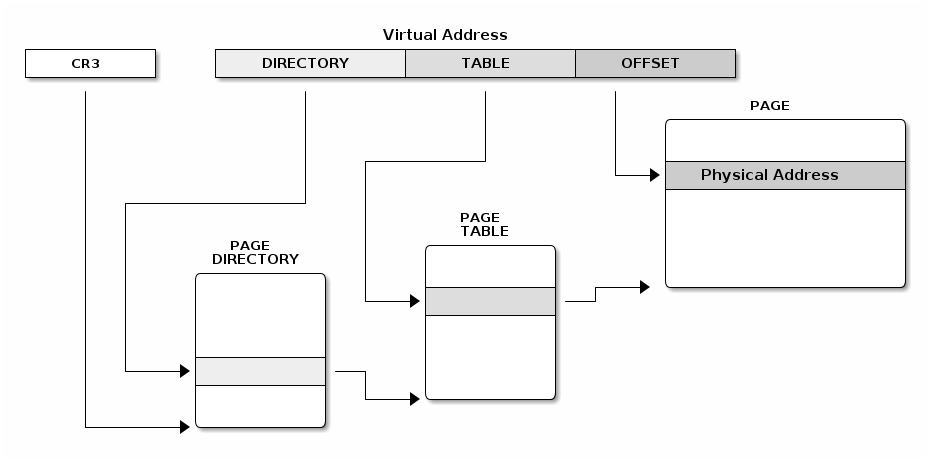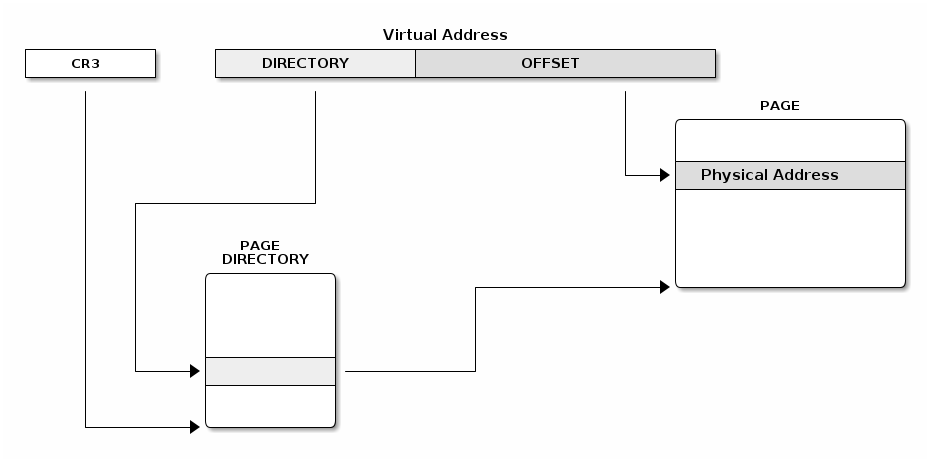Address Space
- x86 MMU
- Segmentation
- Paging
- TLB
- Linux Address Space
- User
- Kernel
- High memory
x86 MMU

Selectors

- Selectors: CS, DS, SS, ES, FS, GS
- Index: indexes the segment descriptor table
- TI: selects either the GDT or LDT
- RPL: for CS only indicates the running (current) priviledge level
- GDTR and LDTR registers points to the base of GDP and LDT
Segment descriptor

- Base: linear address for the start of the segment
- Limit: size of the segment
- G: granularity bit: if set the size is in bytes otherwise in 4K pages
- B/D: data/code
- Type: code segment, data/stack, TSS, LDT, GDT
- Protection: the minimum priviledge level required to access the segment (RPL is checked against DPL)
Segmentation in Linux
/*
* The layout of the per-CPU GDT under Linux:
*
* 0 - null <=== cacheline #1
* 1 - reserved
* 2 - reserved
* 3 - reserved
*
* 4 - unused <=== cacheline #2
* 5 - unused
*
* ------- start of TLS (Thread-Local Storage) segments:
*
* 6 - TLS segment #1 [ glibc's TLS segment ]
* 7 - TLS segment #2 [ Wine's %fs Win32 segment ]
* 8 - TLS segment #3 <=== cacheline #3
* 9 - reserved
* 10 - reserved
* 11 - reserved
*
* ------- start of kernel segments:
*
* 12 - kernel code segment <=== cacheline #4
* 13 - kernel data segment
* 14 - default user CS
* 15 - default user DS
* 16 - TSS <=== cacheline #5
* 17 - LDT
* 18 - PNPBIOS support (16->32 gate)
* 19 - PNPBIOS support
* 20 - PNPBIOS support <=== cacheline #6
* 21 - PNPBIOS support
* 22 - PNPBIOS support
* 23 - APM BIOS support
* 24 - APM BIOS support <=== cacheline #7
* 25 - APM BIOS support
*
* 26 - ESPFIX small SS
* 27 - per-cpu [ offset to per-cpu data area ]
* 28 - stack_canary-20 [ for stack protector ] <=== cacheline #8
* 29 - unused
* 30 - unused
* 31 - TSS for double fault handler
*/
DEFINE_PER_CPU_PAGE_ALIGNED(struct gdt_page, gdt_page) = { .gdt = {
#ifdef CONFIG_X86_64
/*
* We need valid kernel segments for data and code in long mode too
* IRET will check the segment types kkeil 2000/10/28
* Also sysret mandates a special GDT layout
*
* TLS descriptors are currently at a different place compared to i386.
* Hopefully nobody expects them at a fixed place (Wine?)
*/
[GDT_ENTRY_KERNEL32_CS] = GDT_ENTRY_INIT(0xc09b, 0, 0xfffff),
[GDT_ENTRY_KERNEL_CS] = GDT_ENTRY_INIT(0xa09b, 0, 0xfffff),
[GDT_ENTRY_KERNEL_DS] = GDT_ENTRY_INIT(0xc093, 0, 0xfffff),
[GDT_ENTRY_DEFAULT_USER32_CS] = GDT_ENTRY_INIT(0xc0fb, 0, 0xfffff),
[GDT_ENTRY_DEFAULT_USER_DS] = GDT_ENTRY_INIT(0xc0f3, 0, 0xfffff),
[GDT_ENTRY_DEFAULT_USER_CS] = GDT_ENTRY_INIT(0xa0fb, 0, 0xfffff),
#else
[GDT_ENTRY_KERNEL_CS] = GDT_ENTRY_INIT(0xc09a, 0, 0xfffff),
[GDT_ENTRY_KERNEL_DS] = GDT_ENTRY_INIT(0xc092, 0, 0xfffff),
[GDT_ENTRY_DEFAULT_USER_CS] = GDT_ENTRY_INIT(0xc0fa, 0, 0xfffff),
[GDT_ENTRY_DEFAULT_USER_DS] = GDT_ENTRY_INIT(0xc0f2, 0, 0xfffff),
/*
* Segments used for calling PnP BIOS have byte granularity.
* They code segments and data segments have fixed 64k limits,
* the transfer segment sizes are set at run time.
*/
/* 32-bit code */
[GDT_ENTRY_PNPBIOS_CS32] = GDT_ENTRY_INIT(0x409a, 0, 0xffff),
/* 16-bit code */
[GDT_ENTRY_PNPBIOS_CS16] = GDT_ENTRY_INIT(0x009a, 0, 0xffff),
/* 16-bit data */
[GDT_ENTRY_PNPBIOS_DS] = GDT_ENTRY_INIT(0x0092, 0, 0xffff),
/* 16-bit data */
[GDT_ENTRY_PNPBIOS_TS1] = GDT_ENTRY_INIT(0x0092, 0, 0),
/* 16-bit data */
[GDT_ENTRY_PNPBIOS_TS2] = GDT_ENTRY_INIT(0x0092, 0, 0),
/*
* The APM segments have byte granularity and their bases
* are set at run time. All have 64k limits.
*/
/* 32-bit code */
[GDT_ENTRY_APMBIOS_BASE] = GDT_ENTRY_INIT(0x409a, 0, 0xffff),
/* 16-bit code */
[GDT_ENTRY_APMBIOS_BASE+1] = GDT_ENTRY_INIT(0x009a, 0, 0xffff),
/* data */
[GDT_ENTRY_APMBIOS_BASE+2] = GDT_ENTRY_INIT(0x4092, 0, 0xffff),
[GDT_ENTRY_ESPFIX_SS] = GDT_ENTRY_INIT(0xc092, 0, 0xfffff),
[GDT_ENTRY_PERCPU] = GDT_ENTRY_INIT(0xc092, 0, 0xfffff),
GDT_STACK_CANARY_INIT
#endif
} };
EXPORT_PER_CPU_SYMBOL_GPL(gdt_page);
Inspecting selectors and segments
Regular paging

Extended paging

Page tables
- Both page directory and page table have 1024 entries
- Each entry has 4 bytes
- The special CR3 register point to the base of the page directory
- Page directory entries points to the base of the page table
- All tables are stored in memory
- All table addresses are physical addresses
Page table entry fields
- Present/Absent
- PFN (Page Frame Number): the most 20 significant bits of the physical address
- Accessed - not updated by hardware (can be used by OS for housekeeping)
- Dirty - not updated by hardware (can be used by OS for housekeeping)
- Access rights: Read/Write
- Privilege: User/Supervisor
- Page size - only for page directory; if set extended paging is used
- PCD (page cache disable), PWT (page write through)
Linux paging

Linux APIs for page table handling
struct * page;
pgd_t pgd;
pmd_t pmd;
pud_t pud;
pte_t pte;
void *laddr, *paddr;
pgd = pgd_offset(mm, vaddr);
pud = pud_offet(pgd, vaddr);
pmd = pmd_offset(pud, vaddr);
pte = pte_offset(pmd, vaddr);
page = pte_page(pte);
laddr = page_address(page);
paddr = virt_to_phys(laddr);
What about platforms with less then 4 levels of pagination?
static inline pud_t * pud_offset(pgd_t * pgd,unsigned long address)
{
return (pud_t *)pgd;
}
static inline pmd_t * pmd_offset(pud_t * pud,unsigned long address)
{
return (pmd_t *)pud;
}
Translation Look-aside Buffer
- Caches paging information (PFN, rights, privilege)
- Content Addressable Memory / Associative Memory
- Very small (64-128)
- Very fast (single cycle due to parallel search implementation)
- CPUs usually have two TLBs: i-TLB (code) and d-TLB (data)
- TLB miss penalty: up hundreds of cycles
TLB invalidation
Single address invalidation:
mov $addr, %eax
invlpg %(eax)
Full invalidation:
mov %cr3, %eax
mov %eax, %cr3
Address space options for 32bit systems

Advantages and disadvantages
- Disadvantages for dedicated kernel space:
- Fully invalidating the TLB for every system call
- Disadvantages for shared address space
- Less address space for both kernel and user processes
Linux address space for 32bit systems

Virtual to physical address translations for I/O transfers
- Use the virtual address of a kernel buffer in order to copy to data from from user space
- Walk the page tables to transform the kernel buffer virtual address to a physical address
- Use the physical address of the kernel buffer to start a DMA transfer
Linear mappings
- Virtual to physical address space translation is reduced to one operation (instead of walking the page tables)
- Less memory is used to create the page tables
- Less TLB entries are used for the kernel memory
Highmem

Multi-page permanent mappings
void* vmalloc(unsigned long size);
void vfree(void * addr);
void *ioremap(unsigned long offset, unsigned size);
void iounmap(void * addr);
Fixed-mapped linear addresses
- Reserved virtual addresses (constants)
- Mapped to physical addresses during boot
set_fixmap(idx, phys_addr)
set_fixmap_nocache(idx, phys_addr)
Fixed-mapped linear addresses
/*
* Here we define all the compile-time 'special' virtual
* addresses. The point is to have a constant address at
* compile time, but to set the physical address only
* in the boot process.
* for x86_32: We allocate these special addresses
* from the end of virtual memory (0xfffff000) backwards.
* Also this lets us do fail-safe vmalloc(), we
* can guarantee that these special addresses and
* vmalloc()-ed addresses never overlap.
*
* These 'compile-time allocated' memory buffers are
* fixed-size 4k pages (or larger if used with an increment
* higher than 1). Use set_fixmap(idx,phys) to associate
* physical memory with fixmap indices.
*
* TLB entries of such buffers will not be flushed across
* task switches.
*/
enum fixed_addresses {
#ifdef CONFIG_X86_32
FIX_HOLE,
#else
#ifdef CONFIG_X86_VSYSCALL_EMULATION
VSYSCALL_PAGE = (FIXADDR_TOP - VSYSCALL_ADDR) >> PAGE_SHIFT,
#endif
#endif
FIX_DBGP_BASE,
FIX_EARLYCON_MEM_BASE,
#ifdef CONFIG_PROVIDE_OHCI1394_DMA_INIT
FIX_OHCI1394_BASE,
#endif
#ifdef CONFIG_X86_LOCAL_APIC
FIX_APIC_BASE, /* local (CPU) APIC) -- required for SMP or not */
#endif
#ifdef CONFIG_X86_IO_APIC
FIX_IO_APIC_BASE_0,
FIX_IO_APIC_BASE_END = FIX_IO_APIC_BASE_0 + MAX_IO_APICS - 1,
#endif
#ifdef CONFIG_X86_32
FIX_KMAP_BEGIN, /* reserved pte's for temporary kernel mappings */
FIX_KMAP_END = FIX_KMAP_BEGIN+(KM_TYPE_NR*NR_CPUS)-1,
#ifdef CONFIG_PCI_MMCONFIG
FIX_PCIE_MCFG,
#endif
Conversion between virtual address fixed address indexes
#define __fix_to_virt(x) (FIXADDR_TOP - ((x) << PAGE_SHIFT))
#define __virt_to_fix(x) ((FIXADDR_TOP - ((x)&PAGE_MASK)) >> PAGE_SHIFT)
#ifndef __ASSEMBLY__
/*
* 'index to address' translation. If anyone tries to use the idx
* directly without translation, we catch the bug with a NULL-deference
* kernel oops. Illegal ranges of incoming indices are caught too.
*/
static __always_inline unsigned long fix_to_virt(const unsigned int idx)
{
BUILD_BUG_ON(idx >= __end_of_fixed_addresses);
return __fix_to_virt(idx);
}
static inline unsigned long virt_to_fix(const unsigned long vaddr)
{
BUG_ON(vaddr >= FIXADDR_TOP || vaddr < FIXADDR_START);
return __virt_to_fix(vaddr);
}
inline long fix_to_virt(const unsigned int idx)
{
if (idx >= __end_of_fixed_addresses)
__this_fixmap_does_not_exist();
return (0xffffe000UL - (idx << PAGE_SHIFT));
}
Temporary mappings
kmap_atomic(),kunmap_atomic()- No context switch is permitted in atomic kmap section
- Can be used in interrupt context
- No locking required
- Only invalidates on TLB entry
Temporary mappings implementation
#define kmap_atomic(page) kmap_atomic_prot(page, kmap_prot)
void *kmap_atomic_high_prot(struct page *page, pgprot_t prot)
{
unsigned long vaddr;
int idx, type;
type = kmap_atomic_idx_push();
idx = type + KM_TYPE_NR*smp_processor_id();
vaddr = __fix_to_virt(FIX_KMAP_BEGIN + idx);
BUG_ON(!pte_none(*(kmap_pte-idx)));
set_pte(kmap_pte-idx, mk_pte(page, prot));
arch_flush_lazy_mmu_mode();
return (void *)vaddr;
}
EXPORT_SYMBOL(kmap_atomic_high_prot);
static inline int kmap_atomic_idx_push(void)
{
int idx = __this_cpu_inc_return(__kmap_atomic_idx) - 1;
#ifdef CONFIG_DEBUG_HIGHMEM
WARN_ON_ONCE(in_irq() && !irqs_disabled());
BUG_ON(idx >= KM_TYPE_NR);
#endif
return idx;
}
Implementation of temporary mappings
- Use the fixed-mapped linear addresses
- Every CPU has KM_TYPE_NR reserved entries to be used for temporary mappings
- Stack like selection: every user picks the current entry and increments the "stack" counter
Permanent mappings
kmap(),kunmap()- Context switches are allowed
- Only available in process context
- One page table is reserved for permanent mappings
- Page counter
- 0 - page is not mapped, free and ready to use
- 1 - page is not mapped, may be present in TLB needs flushing before using
- N - page is mapped N-1 times